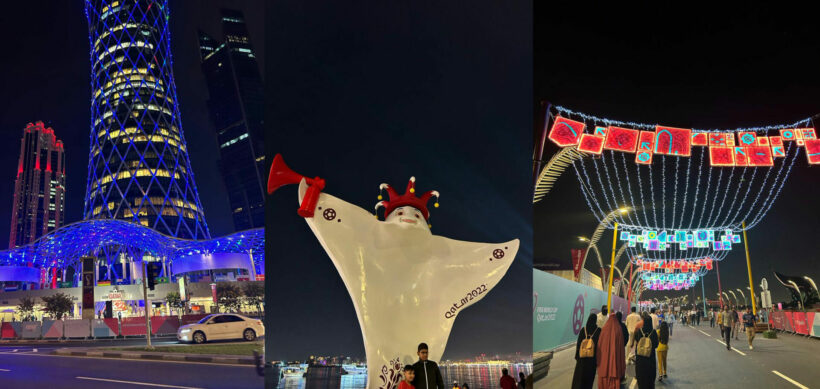Since the historical decision when Qatar was awarded the FIFA hosting rights in 2010, it has constructed seven gigantic stadiums and refurbished Stadium 974, named after the country’s international dialing code. This stadium has more than normal stadium value. It is a port-side structure with more than 40,000 seats built also from recycled shipping containers and steel. A virtual city will house the stadium where the final match will be held. Qatar has also constructed state-of-the-art infrastructure, a new airport, a metro system, a series of roads and 100 new hotels. No other Muslim nation has hosted such a sizeable global event. Players, fans, sports administrators, and social media alike have declared it as the “Best World Cup ever”.
By Dr Ranjan Solomon
The western media had audaciously labeled Qatar with racial-colonial stereotypes and were iniquitous in the reportage of the buildup. BBC irrationally boycotted the opening ceremonies. Their loss, it turned out to be. English fans at home watched the ceremonies nevertheless. Qatar chose to chip away with dogged determination, and created the architecture of the perfect preparatory plan to harness human expertise, and financial investment. They have now altered the story line and fans are loudly singing songs of praise. .
ITV’s Mark Pougatch splashed a pertinent observation: Qatar gave fans from Africa and the Middle East centre stage, and a generally soother milieu “without the hostility and aggro associated with alcohol”. Europeans arrived internalized with prejudice about the alcohol ban. This ban has harvested safety and freedom for people, especially women, to roam the streets late into the night safe and secure. Budweisser sales were set to skyrocket during the 29-day tournament. You could have alcohol in the hotels but not on the grounds. Result? Hooliganism banned!
Ellie Molloson, a campaigner for better match-day experiences for women stated: “… coming here has been a real shock to my system… no catcalls, wolf whistles or sexism of any kind.” The World Cup ripped apart negative of myths about Arabs and Muslims. It has served as the fulcrum of friendliness, respect and hospitality associated with visiting a Muslim country. During the opening ceremony of the World Cup, Morgan Freeman, and Ghanem Al-Moftah, a Qatari YouTuber and philanthropist with caudal regression syndrome conveyed a shared moment of reflection on how Islam’s message is one of unity and understanding. Biased impressions underwent a 180 degree transition. Instances of large conversions to Islam left people pleasantly surprised. Listening to the Azan sung from a remote controlled earphone was sobering and peace-giving. Visitors visited Masjids and encountered the rich Qatari culture. 700 camels joined an animal pageant with a $2.25 million prize money tag – a taste of local culture and numerous ground-breaking episodes.
Fans brought into centre-stage their urgency for a just world. Celebration of Palestine and the Palestinian flag at the Qatar World Cup 2022 by millions of Arab fans were compelling reasons to rethink assumptions on Arab people’s relationship with Palestine. European fans also sloganeered, “Free Palestine” and waved Palestinian flags. Israelis on the grounds were shunned when their media traversed the grounds insensitive to what Israel was doing in the Palestinian Territories through cruel battering, land theft, and refusing to end apartheid politics. Clearly Arab people remain steadfast in their allegiance to the Palestinian struggle for freedom. Israelis were baffled and even fuming as they sought to manipulate and only ended failing to make the link between Israel’s apartheid and military occupation in Palestine. Moroccan fans draped in harmonizing outfits, sang songs, chanted and danced with fervor. They wore Palestinian kuffiyas with the colours of the Palestinian flag. Moroccans equivocally claimed: ‘The love for Palestine runs in our veins.”
Now on not only the uniquely rich white countries host the World Cup anymore. A Muslim country hosts the FIFA tournament in its magnificent eight stadiums, and the doors are pushed open for Muslim nations to be equal partners with imperialist nations. Qatar is making FIFA history because it is the smallest country ever to host the world’s biggest sporting event. Qatar has added to its national stock hotels and stadiums – future Qatar treasures. Most crucially, Qatar has created an image make-over.
The most tangible example transformation was in the treatment of migrant workers. An investigation by the International Trade Union Confederation (ITUC) in 2013 prompted global outrage when it claimed that thousands of laborers from countries such as India, Bangladesh and Nepal were being forced to adhere to the ‘kafala’ system of employment in order to build Qatar’s World Cup infrastructure. Qatar reformed its kafala system. ITUC General Secretary, Burrows, one of Qatar’s most strident critics, has since lauded the emirate as a role model for migrant worker’s standards. Strident changes dot the arena of women’s sports. Striking evidence suggests that the World Cup has acted as a catalyst for gender-inclusivity.
The myth of the Arab as the ‘other’, an uncivilized, non-Christian, exotic and inferior entity whose social order is utterly opposed to modern values of the West lies shattered. Qatar deconstructed these myths and now the world has a model – non-western, and possibly superior to what the West offers. Qatar built a new identity as an emerging model of a modern monarchy-state that succeeded in finding the right balance between modern efficiency, symbolized in the efficient management of mega-sport projects, and the authenticity of Arab culture.
Goa could learn a thing or two from Qatar. Upgraded plans laid for hosting BRICS in Goa lie incomplete six years on. The Colva road broadening is finally being sorted; Attal Settu lies incomplete as do multiple across-the-board projects and infrastructure in disrepair. Panjim is in shambles. White elephants galore are closeted in the political cabinet!
An array of international events is on the anvil in Goa. It is a gripping urgency to shun rhetoric, and get work done. Goa could learn a few things from Qatar. Political willpower alone is the way.
Ranjan Solomon is a political commentator






